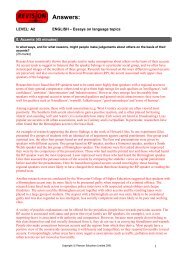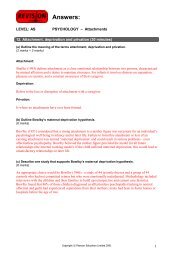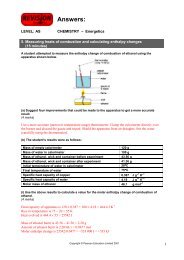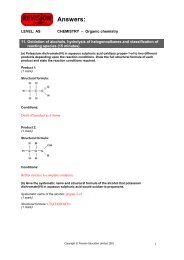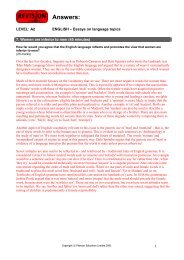The Dove Campaign for Real Beauty - Pearson
The Dove Campaign for Real Beauty - Pearson
The Dove Campaign for Real Beauty - Pearson
Create successful ePaper yourself
Turn your PDF publications into a flip-book with our unique Google optimized e-Paper software.
Chapter 2 Sustainable marketing: marketing ethics and social responsibilityby determining the needs and wants of a target group of customers and fulfilling those needs andwants more effectively and efficiently than the competition. <strong>The</strong> focus is on what customers wantnow. Try to foist upon them what they do not want and they will buy elsewhere. That is why carsare getting larger and more powerful, why washing detergents still contain phosphates and why manybreakfast meals contain more sugar or fat than is good <strong>for</strong> us. Marketers succeed by finding aneed and fulfilling it. Sustainable marketing projects our focus on the long-run welfare of society.Shoddy or defective goods<strong>The</strong> first time dimension of sustainable marketing examines the welfare of customers now and inthe future. This dimension has escalating levels of concern. <strong>The</strong> first is the provision of shoddygoods or defective goods.This customer really did not want holes but needed them to fix a coat hook. He bought theappropriate-looking coat hooks from Focus, a DIY chain, and these came with screws <strong>for</strong>fixing. If they looked good, his aim was to fit out the whole corridor with these nifty hooks. Beinghandy, the customer recognised that it would be better to drill holes <strong>for</strong> the screws be<strong>for</strong>e fixingthem. This he did, but when trying to fix the first screw it sheared, leaving an ugly bit of metalin a hole. He remeasured and tried a second screw. That also sheared, leaving a second uglyhole . . .<strong>The</strong> customer had fulfilled his immediate need when buying the coat hooks, but ended up veryannoyed. Focus had also fulfilled their immediate need by buying the coat hooks, as had themaker of the coat hooks in buying appropriately sized screws. At the same time, all lost becauseof the shoddy little component. For Focus, the defective goods had to be refunded, the follow-uporder never came and the customer talked to others.<strong>The</strong> marketing of shoddy ineffective goods is not sustainable because customers are likely tofind out, stop buying and pass on in<strong>for</strong>mation to their friends. Many companies make a living byknowingly fulfilling customer’s immediate needs by mis-selling or selling shoddy goods. Probablythe extreme case of this is the sale of bootlegged drugs that are, at their best, only theft but, attheir worst, lethal. Bootlegging of music or books may seem a relatively harmless crime, butconsider the long-run impact: what is the chance of a music industry or literature developing ina country where any creative output is immediately stolen?Any company making anything can discover that the product is either defective or dangerous.3M phased out products containing PFOS when they discovered the potential damage of theproduct without any legal action <strong>for</strong>cing them to do so. This contrasts with denial that sometimesoccurs when dangers are uncovered.Ford were aware of design flaws in their 1970s Ford Pinto but allegedly decided it would becheaper to pay off possible lawsuits <strong>for</strong> resulting deaths than to change the car’s design. Amagazine obtained the cost-benefit analysis that it said Ford had used to compare the cost of an$11 (€7) repair against the cost of paying off potential lawsuits. Ford’s reputation was hugelydamaged by this disclosure as they were in the dispute with Firestone decades later over theFord Explorer accidents. 45109



